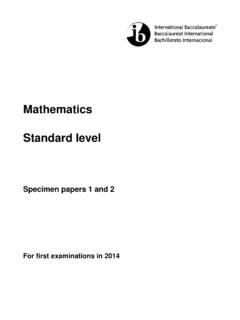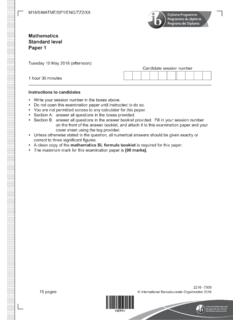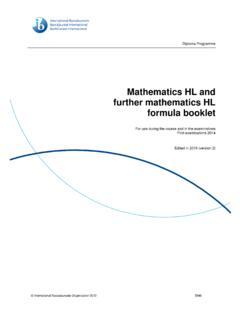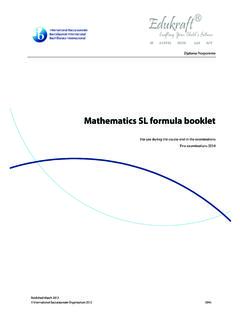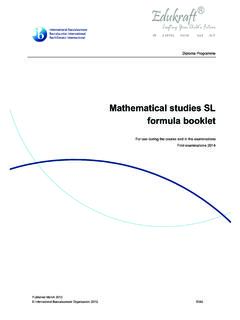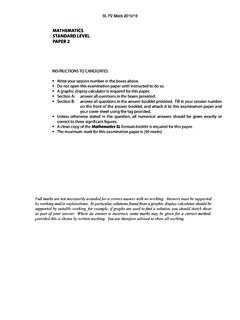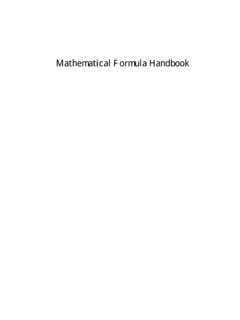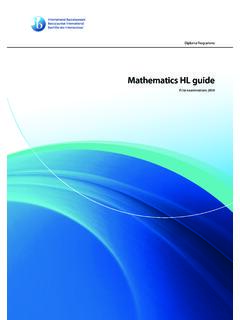Transcription of Workshop Resource Book - TED Ankara Koleji Kütüphane ve ...
1 IB Math HL & SL Workshop Page 1 IB mathematics Higher Level & IB mathematics Standard Level Workshop Resource book 4-5 September 2012 Izmir, Turkey Tim Garry IB Math HL & SL Workshop Page 2 ** Note ** The 2006 courses had their first exams in May 2006 and will have their last exams in November 2013. The new 2014 courses will have their first exams in May 2014 and their last exams in November 2020. Workshop Schedule (draft) TUESDAY 1 9:00-10:15 Introductions. Workshop schedule & Resource book . Overview of changes to new 2014 Math HL & SL courses. Calculator technology. 10:15-10:45 coffee break 2 10:45-12:00 Overview of new internal assessment for HL & SL (Exploration).
2 Management of the new IA scheduling, ideas, resources, forms. 12:00-13:15 lunch 3 13:15-14:30 Samples of student Explorations. Marking a student Exploration. Teacher Support Material (TSM) for IA. 14:30-15:00 coffee break 4 15:00-16:15 Technology in teaching and assessment. IB exams and GDC use. Resources for Math HL & SL textbooks, software, websites. WEDNESDAY 5 9:00-10:15 Theory of Knowledge activity. Math SL & HL mock exams samples. Writing a mock exam. Use of past exams. 10:15-10:45 coffee break 6 10:45-12:00 Management of current IA (Portfolio Tasks). Closer look at new syllabus content in SL & HL. 12:00-13:15 lunch 7 13:15-14:30 IB exam structure Paper 1 & Paper 2. Use of exam markschemes. Marking student samples. 14:30-15:00 coffee break 8 15:00-16:15 Sharing teaching ideas & materials. Preparing students for exams. Current and future developments in mathematics education. IB Math HL & SL Workshop Page 3 ~ Diversion #1 ~ ~ Diversion #2 ~ ~ Diversion #3 ~ ~ Diversion #4 ~ ~ Diversion #5 ~ ~ Diversion #6 ~ IB Math HL & SL Workshop booklet Table of Contents IBDP & Group 5 IB Learner Profile 4 Aims & Objectives 5 Course Planning New SL Course (2014) Summary of Changes 7 New HL Course (2014) Summary of Changes 9 Comparison of SL and HL syllabuses for 2006 course 14 New SL Syllabus (2014) Syllabus Content 25 Suggested teaching units SL & HL (2014 courses)
3 29 External Assessment Written Exams External Assessment format change starting May 2008 30 Points to consider when writing a mock examination 31 Sample SL mock Paper 1 exam & markscheme 32 Sample HL mock Paper 1 exam & markscheme 47 Sample HL mock Paper 2 exam & markscheme 69 Exam Tips / Advice for Students (33) 90 Internal Assessment (IA) - Exploration & Portfolio IA (2014) Exploration Teacher Support 93 Exploration (IA) FAQs 101 Assessment Criteria for the Exploration (IA) 104 IA (2006) Portfolio Important Information 107 Portfolio Task - Student Checklist 112 Portfolio Task Type I Scoring Rubric 113 Portfolio Task Type II Scoring Rubric 114 Portfolio Teacher s Record Form A 115 Portfolio Feedback to Student Form B 116 Teaching Materials / Ideas Algebra Prep Exercises (SL & HL) + Worked Solutions 118 Set of 13 SL Unit Tests 123 Theory of Knowledge (TOK) mathematics TOK Questions 147 TOK Activity Conjecturing & Proof 149 Is mathematics Invented or Discovered?
4 150 Miscellaneous Recommendations / Suggestions 152 IB Math HL & SL Workshop Page 4 IB Math HL & SL Workshop Page 5 Aims Group 5 aims The aims of all mathematics courses in group 5 are to enable students to: 1. Enjoy mathematics , and develop an appreciation of the elegance and power of mathematics 2. Develop an understanding of the principles and nature of mathematics 3. Communicate clearly and confidently in a variety of contexts 4. Develop logical, critical and creative thinking, and patience and persistence in problem-solving 5. Employ and refine their powers of abstraction and generalization 6. Apply and transfer skills to alternative situations, to other areas of knowledge and to future developments 7. Appreciate how developments in technology and mathematics have influenced each other 8.
5 Appreciate the moral, social and ethical implications arising from the work of mathematicians and the applications of mathematics 9. Appreciate the international dimension in mathematics through an awareness of the universality of mathematics and its multicultural and historical perspectives 10. Appreciate the contribution of mathematics to other disciplines, and as a particular area of knowledge in the TOK course Assessment objectives Problem-solving is central to learning mathematics and involves acquisition of mathematical skills and concepts in a wide range of situations, including non-routine, open-ended and real-world problems. Having followed a DP mathematics SL course, students will be expected to demonstrate the following. 1. Knowledge and understanding: recall, select and use their knowledge of mathematical facts, concepts and techniques in a variety of familiar and unfamiliar contexts 2. Problem-solving: recall, select and use their knowledge of mathematical skills, results and models in both real and abstract contexts to solve problems 3.
6 Communication and interpretation: transform common realistic contexts into mathematics ; comment on the context; sketch or draw mathematical diagrams, graphs or constructions both on paper and using technology; record methods, solutions and conclusions using standardized notation 4. Technology: use technology, accurately, appropriately and efficiently both to explore new ideas and to solve problems 5. Reasoning: construct mathematical arguments through use of precise statements, logical deduction and inference, and by the manipulation of mathematical expressions 6. Inquiry approaches: investigate unfamiliar situations, both abstract and real-world, involving organizing and analysing information, making conjectures, drawing conclusions and testing their validity IB Math HL & SL Workshop Page 6 ~ Diversion #1 ~ IB Math HL & SL Workshop Page 7 mathematics Standard Level - 2014 course 2006 course Revised ( new ) course teaching starts in August 2012 with first exams in May 2014 Summary of changes from 2006 SL course (last exams 2013) to 2014 SL course *Note: hours given are approximate number of teaching hours suggested for each component of the course 2006 Maths SL course (last exams in May/November 2013) Syllabus content (140 hrs) 1.
7 Algebra (8 hours) 2. Functions and Equations (24 hrs) 3. Circular Functions and Trigonometry (16 hrs) 4. Matrices (10 hrs) 5. Vectors (16 hrs) 6. Statistics and Probability (30 hrs) 7. Calculus (36 hrs) Internal Assessment Portfolio (10 hrs) 2014 Maths SL course (first exams in May/November 2014) Syllabus content (140 hrs) 1. Algebra (9 hours) 2. Functions and Equations (24 hrs) 3. Circular Functions and Trigonometry (16 hrs) 4. Vectors (16 hrs) 5. Statistics and Probability (35 hrs) 6. Calculus (40 hrs) Internal Assessment Mathematical Exploration (10 hrs) IB Math HL & SL Workshop Page 8 nr Summary of Changes to Maths SL course Other changes: The format of the course syllabus has changed. The current SL course (2006 SL course) had three columns: (1) Content, (2) Amplifications/Inclusions, and (3) Exclusions. The syllabus for the new SL course (2014 SL course) has the following three columns: (1) Content, (2) Further Guidance, and (3) Links.
8 The Links column in the syllabus provides useful links to the aims of the course containing suggestions for discussion, real-life examples and ideas for further investigation. The Aims and Objectives for Group 5 ( mathematics & computer science) have been revised. Presumed Knowledge is now called Prior Learning Topics There are some minor changes to the external assessment. Although Paper 1 and Paper 2 will continue to be worth 90 marks each, the 90 marks may not necessarily be divided evenly between Section A and Section B. Section A and Section B will each be worth approximately 45 marks. Linear correlation of bivariate data is not being added to the HL core syllabus (being added to HL Statistics & Probability option topic). Therefore, SL syllabus content is no longer a strict subset of the HL core syllabus content. 2006 SL course 2014 SL course Changes Syllabus content (140 hrs) 1. Algebra (8 hrs) 1. Algebra (9 hrs) Calculation of binomial coefficient using both GDC and formula .
9 2. Functions and Equations (24 hrs) 2. Functions and Equations (24 hrs) Encouragement to connect with applications in physics, chemistry economics, etc. 3. Circular Functions & Trigonometry (16 hrs) 3. Circular Functions & Trigonometry (16 hrs) Know exact values of trigonometric ratios of 0, , , ,6 4 3 2 and their multiples. 4. Matrices (10 hrs) Content on matrices removed. 5. Vectors (16 hrs) 4. Vectors (16 hrs) No changes. 6. Statistics & Probability (30 hrs) 5. Statistics & Probability (35 hrs) statistical outliers defined; linear correlation of bivariate data including: Pearson s product-moment correlation coefficient r; scatter diagrams and lines of best fit; equation for regression line of y on x and use of this equation for prediction purposes; no statistical tables in formula booklet 7. Calculus (36 hrs) 6. Calculus (40 hrs) limit notation; integration by inspection, or substitution of the form f g x g x dx Internal Assessment (10 hrs) two portfolio tasks one mathematical exploration A 6-12 page report written by each student focusing on a topic chosen by them and assessed by the teacher using five criteria.
10 IB Math HL & SL Workshop Page 9 Summary of Changes to Maths HL course IB Math HL & SL Workshop Page 10 IB Math HL & SL Workshop Page 11 IB Math HL & SL Workshop Page 12 IB Math HL & SL Workshop Page 13 Summary of changes to HL options IB Math HL & SL Workshop Page 14 Math HL Comparison of SL and HL syllabuses for 2006 course (last exams 2013) Syllabus content 140 hrs Topic 1 - Algebra 8 hrs Topic 2 - Functions and equations 24 hrs Topic 3 - Circular functions and trig 16 hrs Topic 4 - Matrices 10 hrs Topic 5 - Vectors 16 hrs Topic 6 - Statistics and probability 30 hrs Topic 7 - Calculus 36 hrs Portfolio 10 hrs Total 150 hrs Core syllabus content 190 hrs Topic 1 - Algebra 20 hrs Topic 2 - Functions and equations 26 hrs Topic 3 - Circular functions and trig 22 hrs Topic 4 - Matrices 12 hrs Topic 5 - Vectors 22 hrs Topic 6 - Statistics and probability 40 hrs Topic 7 - Calculus 48 hrs Portfolio 10 hrs Option syllabus content 40 hrs Total 240 hrs Math SL Topic 1 - Algebra IB Math HL & SL Workshop

